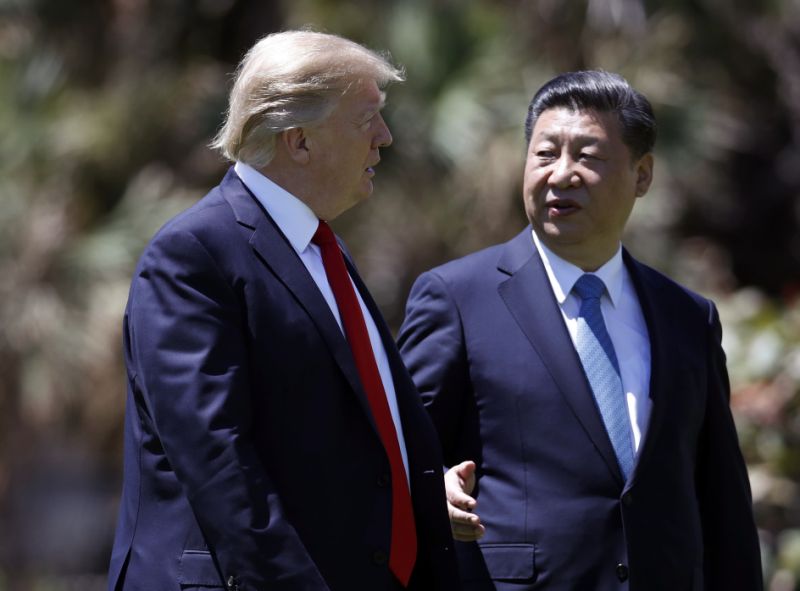Media Report

- The New York Times reports: "China's leader, Xi Jinping, and President Trump spoke by phone on Wednesday about the escalating tensions with North Korea as a prominent Chinese state-run newspaper warned the North that it faced a cutoff of vital oil supplies if it dared test a nuclear weapon...During the call, which was initiated by Mr. Trump, Mr. Xi said that the matter should be solved through peaceful means, the state news agency Xinhua reported. Tensions escalated further on Wednesday as reports said the Japanese Navy would join the United States Navy strike group led by the aircraft carrier Carl Vinson in its mission off the Korean coast...North Korea on Saturday is celebrating the 105th anniversary of the birth of Kim Il-sung, the founder of the nation. Its current leader, Kim Jong-un, his grandson, is expected to use the occasion to either stage a nuclear weapons test or conduct a missile test...In an unusually strong editorial, Global Times, a newspaper that sometimes reflects the thinking of China's leadership, said Beijing would support stiffer United Nations sanctions, including 'strictly limiting' oil exports to North Korea should it conduct a nuclear test."
- Bloomberg View comments: "By mid-afternoon Tuesday, Chinese online anger at United Airlines was running so hot that the hashtag #UnitedForcesPassengerOffPlane was receiving 20 million views per hour on the Sina Weibo social network...It's little wonder that the outrage earned the attention of United Continental Holdings Inc. shareholders, who drove the company's stock down 4 percent while the hashtag was still atop the rankings. On the surface, the nosedive might seem warranted...But in the medium term, United has less to fear from those millions of irked Chinese netizens than one might think. Remember, United is hardly the first foreign company to spur a nationalist backlash in China...And United enjoys one other key advantage in China: As in the U.S., it faces little competition. Thanks to a series of bilateral agreements between the U.S. and China, U.S. airlines are allowed to make only 140 round-trip flights between China and the U.S. per week"
- The Financial Times reports: "Water-guzzling coal-conversion projects are springing to life in arid western China, setting the stage for the large-scale deployment of what was previously a niche industry. A three-year downturn in coal prices has revived projects that convert coal to motor fuel, petrochemical feedstock or gas, after many were shelved in 2008 because of concerns about water supply and pollution. Successful development in China opens the door to the export of coal-intensive technologies, undercutting international efforts to limit emissions of carbon and other greenhouse gases. Coal conversion is not only highly polluting, it also consumes large amounts of water...China's coal giants want to promote coal conversion overseas, especially as part of China's "Belt and Road" initiative...Projects that work in China's state-dominated economy may not be practical elsewhere. Coal conversion has become profitable in China because of an unusual combination of low coal prices relative to state-set gas or petrol prices."
Calendar
- 2017-04-11 Trump Says China Will Get Better Trade Deal if It Solves ‘North Korean Problem’
- 2017-04-10 China offers concessions to avert trade war with US
- 2017-04-09 Trade War Averted as China and US Agree 100-day Plan
- 2017-04-07 At U.S.-China summit, Trump presses Xi on trade, North Korea; progress cited
- 2017-04-06 Signs point away from Trump labelling China currency manipulator
- 2017-04-05 Trump and China: Ahead of Summit, Both Sides Try to Reset Volatile Relationship
- 2017-04-04 Trump-Xi meeting watched for clues of future relationship
- 2017-04-03 What those papers Trump left on his desk reveal about his trade policy
- 2017-03-30 Climate change: China calls US 'selfish' after Trump seeks to bring back coal
- 2017-03-29 China Poised to Take Lead on Climate After Trump’s Move to Undo Policies
News
- The New York Times Xi and Trump Discuss Rising Tensions With North Korea
- The Financial Times China's coal-conversion plants surge back to life
- The Wall Street Journal China Consumer Prices Driven Higher by Greater Education and Health Care Costs
- Bloomberg China Elevates 'Good Cop' on Trade to Counter Trump Barbs
- The Guardian China's Hollywood film quota to expand after Trump trade deal
- Reuters China says Dalai Lama 'provokes' with visit to disputed border with India
- The Washington Post Yahoo accused of mismanaging fund for dissidents in China
- Bloomberg United Backlash Lights Up Weibo, Airports: Eye on Chinese Media
- Reuters A journey to Scarborough Shoal, the South China Sea's 'Waterworld'
- The Associated Press China warns against intervention over detained Taiwanese man
- BBC Bombardier and Siemens 'in train deal talks'
- The New York Times Deal by Chinese Tech Company LeEco for Vizio Dies
- The Financial Times China producer and consumer prices to diverge: analysts
Commentary
- Bloomberg View Why United Won't Lose Altitude in China
- Politico Trump holds call with China's Xi Jinping on 'menace of North Korea'
- The Washington Post: Opinions Why does China pretend to be a democracy?
- Forbes How China Won The Race To Being Considered A Mobile-First Commerce Nation
- The Washington Post: Wonkblog Why China and Canada are playing economic footsie
- Business Insider Whatever Trump said to China about North Korea, it seems like it worked
- Quartz Runners from around the world are flocking to marathons hosted by China's most toxic cities
